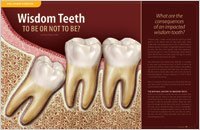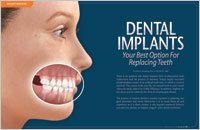If you want to replace a missing or failing tooth with a state-of-the-art dental implant (watch dental implant video), your dentist will first need to make sure that you have sufficient bone in your jaw to anchor the implant. This is true no matter what type of tooth is being replaced. However, if it
Read more
The word “surgery” often brings to mind a stay in the hospital, general anesthesia, and perhaps a lengthy recovery period. However, the experience of having oral surgery is usually very different from that. Oral surgery is often performed in a dental office setting, under local anesthesia, with minimal recovery time. Oral Surgery can range from routine procedures such as tooth extractions and implant placement to more complex jaw realignment surgeries and emergency care for facial trauma.
Oral Surgery Procedures
Oral surgery procedures may be performed to relieve pain, treat an infection or trauma, restore function or improve a person's appearance. Procedures and conditions treated include:
- Tooth Extractions. There are a variety of reasons why you may need a tooth or teeth removed. You may have a wisdom tooth that is impacted; a diseased tooth that can't be saved; or overcrowded teeth that need to be removed so more room can be created to facilitate proper alignment during orthodontics.
 Dental Implants. Today's preferred method of tooth replacement is a titanium dental implant, which is placed beneath the gum line and into the jawbone during a minor surgical procedure. The implant is then attached to a realistic-looking dental crown that is visible above the gum line and indistinguishable from a natural tooth.
Dental Implants. Today's preferred method of tooth replacement is a titanium dental implant, which is placed beneath the gum line and into the jawbone during a minor surgical procedure. The implant is then attached to a realistic-looking dental crown that is visible above the gum line and indistinguishable from a natural tooth.- Oral Diagnosis & Biopsies. When a suspicious oral lesion is found, a biopsy is often used to detect or rule out oral cancer — a disease that is treatable if caught early. A biopsy involves removing a very small tissue sample for laboratory analysis.
- Corrective Jaw Surgery. Sometimes a person's jaws don't fit together properly. This can affect both jaw function and appearance.
- Snoring & Sleep Apnea. Excess tissue in the back of the throat may need to be removed in certain individuals with sleep apnea.
- TMD. When conservative remedies fail to relieve chronic jaw pain over a long period of time, surgery may be considered.
- Facial Trauma & Reconstructive Surgery. Facial injuries can affect not only a person's ability to carry on basic life functions such as eating, but also his or her appearance. Knocked-out teeth can sometimes be re-implanted, or replaced with dental implants.
- Cleft Lip/Palate. These birth defects are among the most common, estimated to affect around one in 700-800 babies born in North America. With proper surgical treatment, the child has an excellent chance of leading a healthy, normal life.
What to expect
Before your oral surgery is performed, x-rays will often be taken to aid in diagnosis and treatment planning. A step-by-step explanation of the procedure along with your anesthesia options will be discussed, and you should feel free to ask any questions you have. Your recovery experience will depend on what procedure you are having as well as your general state of health. It's always important to let your healthcare providers know what medications you are taking (both prescription and over-the-counter), any chronic health conditions you have, and whether you smoke. This will help ensure your safety and comfort — always the paramount concerns.
Related Articles

Wisdom Teeth – To Be Or Not To Be Wisdom teeth, which typically make their appearance between the ages of 17 and 25, can cause significant problems when there is not enough room for them to grow in properly. As a person ages, the effects of retained and impacted wisdom teeth can be more consequential. This article reviews the issues associated with wisdom teeth and whether or not they should be removed... Read Article

Seeking Relief From TMD TMD, or Temporomandibular Disorders, is an umbrella term for various painful conditions that affect the jaw joints. There are different treatment approaches to TMD problems, but not all are based on science. It's important to be up on the latest information and to be an educated consumer. In this comprehensive article, Dear Doctor magazine provides state-of-the-art information and guidance on what you should know, whom you should see, and what you should ask... Read Article

Dental Implants – Your Best Option For Replacing Teeth Dental implants have many advantages over older methods of tooth replacement like bridges and dentures — from the way they function and feel to the way they look and last. Vigorous research has documented and confirmed that in the right situations, dental implant success rates are over 95%. It is no exaggeration to say that they have revolutionized dentistry. They may even change your life... Read Article
-
Sinus Surgery
Category: Oral Surgery
-
Oral Cancer Screening
Category: Oral Surgery
Although oral cancer may not get as much attention as some more widely-known types of cancer, that doesn't mean it's any less deadly. In fact, it is estimated that in the United States, oral cancer is responsible for killing one person every hour, every day. While it accounts for a relatively small percentage
Read more -
Wisdom Teeth
Category: Oral Surgery
In most people, the third set of molars, generally called “wisdom teeth,” start coming in around age 17-25. However, the arrival of these teeth is often far from trouble-free. The extraction (removal) of one or more third molars is a relatively common procedure, performed on some 5 million patients
Read more -
Facial Trauma and Reconstructive Surgery
Category: Oral Surgery
When you were a youngster, did you ever get a black eye, chip a tooth or bruise your cheek? If so, you may have experienced a case (let's hope, a mild one!) of facial trauma. In many situations, however, facial trauma can be severe. Among its major causes are auto accidents, sports injuries, work-related
Read more -
Headaches & Migraines
Category: Oral Surgery
People don't generally think of a dentist as the healthcare professional to see for recurring headaches or migraines; yet dentists can play a role in diagnosing and even treating your condition. That's because quite often, recurring pain that is felt in the area of the temples on the sides of the head
Read more -
Cleft Lip & Palate Repair
Category: Oral Surgery
Cleft lip and cleft palate are among the most common birth defects, estimated to affect around one in 700-800 babies born in North America. Both problems result from the incomplete formation of anatomical structures (the lips and the palate, or “roof of the mouth”) which develop during early pregnancy.
Read more -
Extractions
Category: Oral Surgery
The main goal of dentistry is to preserve your natural teeth and keep them healthy for as long as possible. There are times, however, when it is in your best interest (or your child's) to have a tooth extracted (removed). This could be the case for a variety of reasons. Perhaps you have a tooth that
Read more -
Sedation Dentistry
Category: Oral Surgery
There's so much dentistry can do these days to make your mouth healthier and your smile more beautiful. Yet many people don't take advantage of this because of a long-standing fear of dental treatment. If you are one of these people, rest assured that it's possible to have an experience that's free of
Read more -
Bone Grafting
Category: Oral Surgery
Do you think of bone as a hard, rigid material that never changes? In fact bone remodels itself all the time: Your body is constantly depositing new bone cells and removing old ones. In the case of the bone that supports your teeth, this process can be helpful or harmful. For example, the jawbone's adaptability
Read more -
Blood Thinners & Dental Procedures
Category: Oral Surgery
Millions of people regularly take anticoagulant or antiplatelet medications (sometimes called “blood thinners”) to help prevent heart attack and stroke, and to manage a variety of medical conditions including cardiac arrhythmia and stent placement. While these drugs have proven, life-saving benefits,
Read more -
Oral Diagnosis and Biopsies
Category: Oral Surgery
When you come into the dental office for an examination, you might assume that the focus is on your teeth. That's often correct — but don't forget that there are a number of other parts of the oral and facial anatomy that are examined as well. These include areas around and inside the mouth (such as
Read more -
Corrective Jaw (Orthognathic) Surgery
Category: Oral Surgery
In many cases, problems with the bite or the alignment of the teeth can be corrected using today's advanced methods of dental and orthodontic treatment. Sometimes, however, skeletal and dental irregularities aren't so easy to remedy, even with the most up-to-date non-surgical techniques. That's when
Read more
Contact Us
Princeville Dental
Office Hours
Monday:
8:00 am-5:00 pm
Tuesday:
8:00 am-5:00 pm
Wednesday:
8:00 am-5:00 pm
Thursday:
8:00 am-5:00 pm
Friday:
8:00 am-5:00 pm
Saturday:
Closed
Sunday:
Closed
